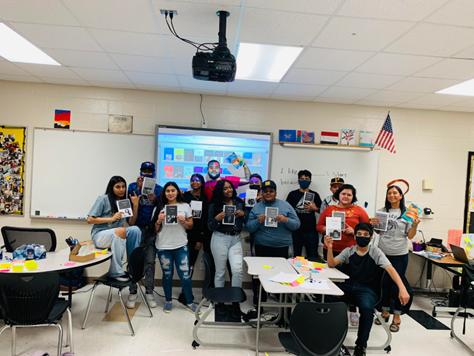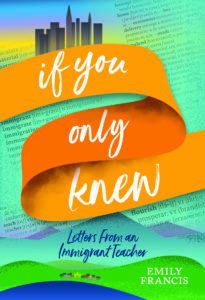“Their Story, Our Legacy”
During the first days back this year, our school received a special guest speaker, former educator and coach, who left a remarkable legacy. Coach Smith was fired up, sharing the wonderful stories that highlighted the amazing history of our school which he collected from 1893 to the day he retired.
I began to think about how his passionate stories impacted every staff member listening. The power of a story hit me to my core, and I began wondering about our students’ stories: What stories are students telling about our school? About us as teachers? Just like Coach Smith can share his powerful and impactful stories about a building, so our students are out and about telling stories about us.
Of course, I connected it to my personal experience as a former student new to the USA. As a fifteen-year-old scared immigrant, I entered high school with so much passion and persistence but left with shattered dreams. My story about my experience as a student in the USA is not a good one. It’s a story of pity and sadness and pain. I can close my eyes and feel exactly how I felt in my high school classes. These were uneasy feelings I don’t want my students to feel.
I cannot remember a teacher who would have incorporated practices to support my culture, identity, and strength. My high school years made me question my own identity. Just the fact that it was never acknowledged made me question my own existence.
Thinking about my personal stories from my former high school and listening to Coach Smith led me to think about my legacy. George Couros said, “Your legacy is not what you do. It’s what your students do because of you.” I dare to add… It’s what your students SAY because of you.
Feeling like we have been robbed of our identity may cause dysfunction in society. I know. I lived it. I now strive every year to make sure equitable practices are in place to better serve our students.
Sense of Belonging
A sense of belonging is imperative. Creating and maintaining a sense of belonging for our immigrant students is key to their success. As an individual from a diverse background, feeling a sense of belonging gives me the space I need to be myself without having to become someone that I am not. It’s the validation and the permission we need to develop our individuality and identity. Look at the decor around your learning space. Does it reflect their experiences, their cultural background? Does it provide an opportunity to not only embrace diversity but also validate other cultures? Make the space say, “We all belong.”
Pedagogical Practices
I have to quote Maya Angelou: “Do the best you can until you know better. Then when you know better, do better.” Some pedagogical practices we implement in the classroom may actually hinder students. The “I’ve always done it this way” approach does not work anymore. Our classrooms are more diverse than ever; meaning, our practices must change, and we must do better for our new generation. I wholeheartedly believe that being an open-minded life-long learner can help us as educators on the lookout for better practices that support students. Immigrant students work twice as much as monolingual English-speaking students to understand what is happening in lessons. With our help and effective classroom practices, we can ensure our students’ success instead of traumatize their learning experiences.
Amplify their Voices
We are not our students’ voices. All students need, especially students with marginalized backgrounds, is a microphone and a space to share who they are. When my high school economics teacher gave me an assignment to read the law of supply and demand, my mind traveled back to when I was in Guatemala City selling oranges for our family business. I was so happy to make a personal connection with the content I was learning. Unfortunately, I didn’t have a relationship with my teacher to ask if I could share that experience. He had never asked about my experiences, so he didn’t know of the asset I would have gladly shared. To amplify students’ voices, we MUST know their stories. We must intentionally embed lessons that serve as opportunities to get to know our students at a deeper level.
One way I encourage my students to share about themselves and their stories is through literature. I choose books that not only represent my students’ cultural backgrounds but also open their perspectives to others. Once students see characters that reflect their journeys, they feel validated, affirmed, and encouraged to tell their own. I’ve seen students cry because they couldn’t believe an immigrant story such as crossing the Rio Grande or deserts was worth telling. They begin to embrace their experiences and use them as stepping stones to success, to enter society with their heads held high and pride in their identity — ready to impact our community and world.
So, what are you doing to make sure your students are telling good stories about you and their learning experience? What’s your legacy?
Published September 1st, 2022 by Seidlitz Education
About the Book: Written with passion and a visceral commitment to her students, If You Only Knew: Letters from An Immigrant Teacher reflects the journey and experiences of Emily Francis, an immigrant and unaccompanied minor who travels from Guatemala to the USA to become a teacher. Once in the classroom, “Ms. Francis” learns about her students’ stories and journeys and begins to see her own life reflected in the lives of her students. Emily starts writing letters to her students in which her story is intertwined with theirs. This offers a unique expression of empathy, which helps them on their own personal journeys as immigrants living and learning in a new country.
“I could… imagine the fear you probably felt as you prepared to walk in a brand new school in a brand new country, so I made a promise that… I would make sure your experience would be a whole lot different than the one you had in that “icebox” with immigration.” (from the letter, “Dear Orlando”)
Speaking to both young adults and their teachers, If You Only Knew delivers support, solace, and empathy for immigrant students whose stories are too often are ignored. From personal experience, Emily Francis’ mission to offer a leg up to immigrant students deeply resonates with everyone interested in the immigrants and their journeys.
About the Author: Emily Francis is a high school ESL (English as a Second Language) teacher at Concord High School in Concord, North Carolina. Her experience as an immigrant from Guatemala and English Language Learner inspired her to become an ESL teacher and equipped her with a deep understanding of the challenges her immigrant students must overcome to find success. Cabarrus County Board of Education’s Teacher of the Year in 2016, she serves as a professional development facilitator, motivational speaker, and board member for the Carolina TESOL. Her book, If You Only Knew: Letters from an Immigrant Teacher, delivers support, solace, and empathy for immigrant students whose stories are too often ignored.
Thank you, Emily, for this post celebrating your students!




1 thought on “Author Guest Post: “Their Story, Our Legacy” by Emily Francis, Author of If You Only Knew: Letters from an Immigrant Teacher”